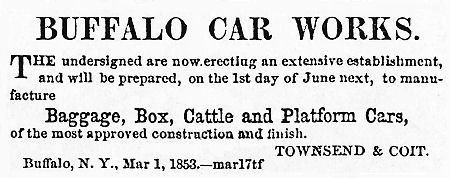Buffalo Car Works
Townsend & Coit
|
Do not be confused by the fact there were two
entities that did business as the Buffalo Car Works. One existed from 1872
to 1899 and was actually a corporation named the Buffalo Car Company. If
it is the one you want, click
HERE. The other existed only
from 1853 to 1857 and was actually the partnership of Townsend & Coit.
If it is the one you want, read on. |
The partnership of Townsend & Coit opened its
Buffalo Car Works in 1853 at Buffalo,
New York. Unlike many car builder’s
plants, which just sort of grew a building at a time, the Buffalo Car Works was laid
out and opened as a complete, ready-to-go installation with 15 buildings. The
car erection shop was 60' x 280' and could build 24 freight cars a week.
{286}
 |
|
(American
Railway Times, 2 Feb 1854) This advertisement ran unchanged from
17 March 1852 to 23 March 1854. |
During the 1850s, log rafts were brought down the Niagara River from Grand
Island. At the car works, “a great gang saw sliced up the logs into eight
sills at a time.” {47}
In 1853, Fitch D. Adams (1822-1904) joined the company as a sub-contractor.
When the Buffalo Car Works failed four years later, he spent a
year in the lumber business and then went into the Buffalo & Erie Railroad car
shops, where he soon became the master car builder. He left that position in
1867 and became superintendent of the
Ohio Falls Car Company. When that
company failed in 1870, he joined the Boston & Albany Railroad, where he
stayed until his retirement in 1896.
{288}
In 1855, the machine shop was lost to fire at an estimated cost of $10,000,
all covered by insurance (unusual for a car-builder).
{290}
By 1856, the car works was using an assembly line approach to car building
{287} —
|
"mention is made that
five men worked as a team to assemble each car. Four of the men started work
at each corner while the fifth helped the others as needed. When the body was
finished, trucks were rolled under the trestles supporting the body above the
floor. The body was then lowered into place, and the car was ready for
painting. Giant saw horses or trestles supported the body 3 or 4 feet above
the floor and acted much like a ship's cradle. This facilitated the assembly
process by allowing access to the underside of the frame."
"It was a build-in-place or fixed-position system of assembly, traditional
for the erection of ships, large machine tools, and steam engines. Wood and
iron parts fabricated elsewhere in the shop complex were delivered to the
setting-up shop for assembly. Thus floor sills, carlines, brake wheels, and
hundreds of other parts were placed at some convenient location on the floor
so as to be nearby yet not directly underfoot. Workmen would fetch the parts
as needed during the putting-together process... "
|
In June of 1856, the car works delivered to the Illinois Central Railroad
six “Gothic” stateroom cars that measured 10' x 50' and contained
between two and six staterooms each {289} —
|
“One of them contains six staterooms, each room having two seats
with cushioned backs long enough for a person to lie upon. The backs of
the seats are hung with hinges at the upper edge, so that they may be
turned up at pleasure, thus forming two single berths, one over the
other, where persons may sleep with all the comfort imaginable. In one
end of the car is a small wash room, with marble wash bowls, looking
glasses, etc. On the opposite side of the car from the stateroom is a
row of seats with revolving backs, similar to barbers’ chairs, so
arranged that the occupant may sit straight or recline in an easy
attitude at pleasure. The other five cars have two or three similar
staterooms.” |
The Buffalo Car Works was apparently wiped out by the financial panic of
1857. {288}
That “panic” began 24 August with the failure of the New York branch of the
Ohio Life Insurance & Trust Company. Among the banks that failed was O. Lee &
Company’s bank at Buffalo due to “a very large accumulation of suspended
debts, amongst which [was] one for $270,000 from the Buffalo Car Company.”
{291}
The “personal effects” of the company were sold off at a sheriff’s sale held
at the company’s shops at Black Rock.
{447}
